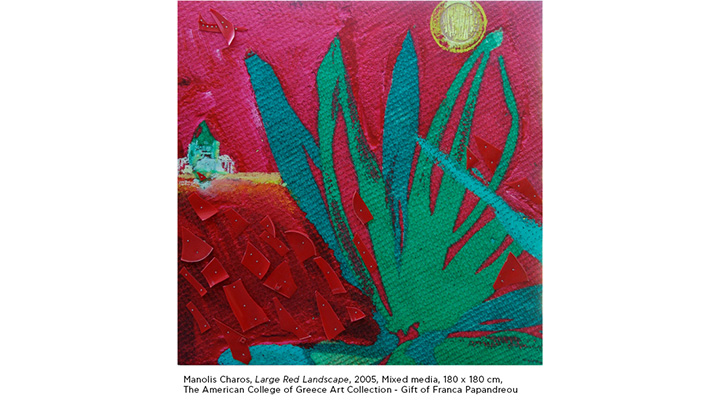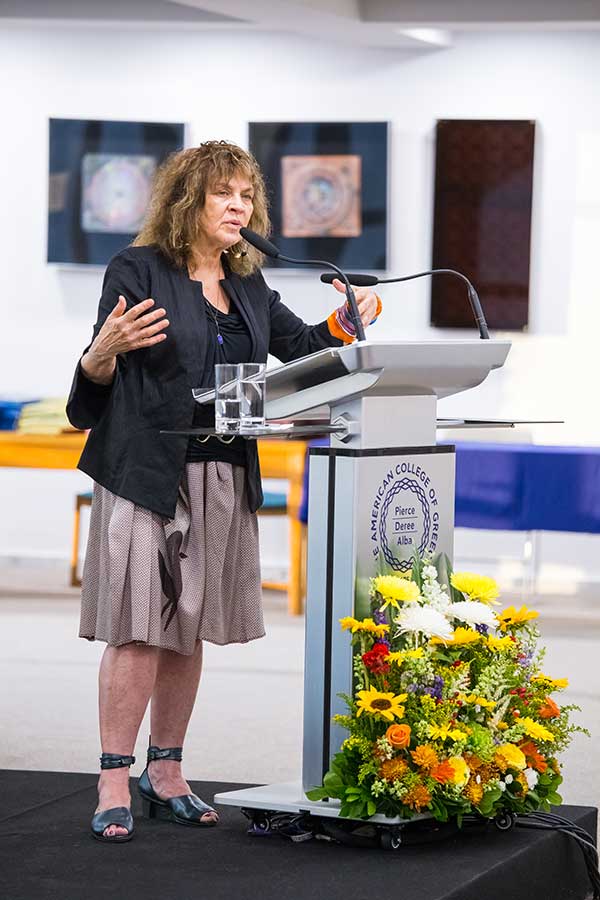
On Monday, June 11, the Upper Level Library was filled with students, faculty and staff who had the unique opportunity to attend the 23rd Kimon Friar Lecture delivered by Carol Becker, Professor of the Arts and Dean of Columbia University School of the Arts. Dr. Becker with her lecture “How We Think About Time: Proposals for a Future World” explored the perception of time and how people experience the world around them based on past occurrences, present circumstances and future expectations. This year, the Lecture was organized in collaboration with the Fulbright Foundation in Greece as part of Fulbright’s 70 years of educational and cultural exchanges between Greece and the United States.
Deree’s Provost, Dr. Thimios Zacharopoulos, a 1994 Fullbright scholar, opened the event and gave the welcoming remarks. During his speech, Dr. Zacharopoulos, proudly mentioned that Kimon Friar had bequeathed part of his personal library and manuscripts to the College. The Provost later presented to the audience the Executive Director of the Fulbright Foundation in Greece, Ms. Artemis Zenetou, who expressed her gratitude to the ACG and the Attica Foundation on making the 23rd Kimon Friar Lecture possible. The event continued with the introduction of Dr. Becker by a former student of hers, and visual artist Georgia Kotretsos.
“The perception of time itself is not a direct subject of history but it is a nonetheless essential to how we experience our world and also to how future civilizations will regard and record our contemporary culture,” expressed Dr. Becker during her lecture.
Speaking of the ability of art to transform time into forms that can be understood by our species, Dr. Becker said: “We come to understand our condition most clearly when artists, writers and thinkers elucidate it; making it more visible to us.”
Carol Becker also presented in detail the different aspects of time and explained that “Humans actually experience time in multiple ways simultaneously without always being aware of its complexity or the particular quality of each category of time; so it is important to ask what are the myriad ways in which we actually experience time and how do we understand these experiences and the way they affect our lives.”
Dean Becker also emphasized the necessity of art as an antidote to the maddening, accelerated pace of our daily lives. “Art has the potential to expand our psyches” she said; “It reminds us that although we are living in this accelerated time we also continue to live in a deep, slow, ancient time of our spiritual selves.” Finally, Carol Becker talked about the time we all hope that have in abundance, in order to live a rich, full life; a time that will be up eventually. “Perhaps we could call this time the never enough time”, she noted ending her compelling lecture; “the time of the long journey home to ourselves when we fulfill the dream of our lives and come to understand that, doing that, was all we were ever intended to do. And in fact for that there is always just enough time.”

